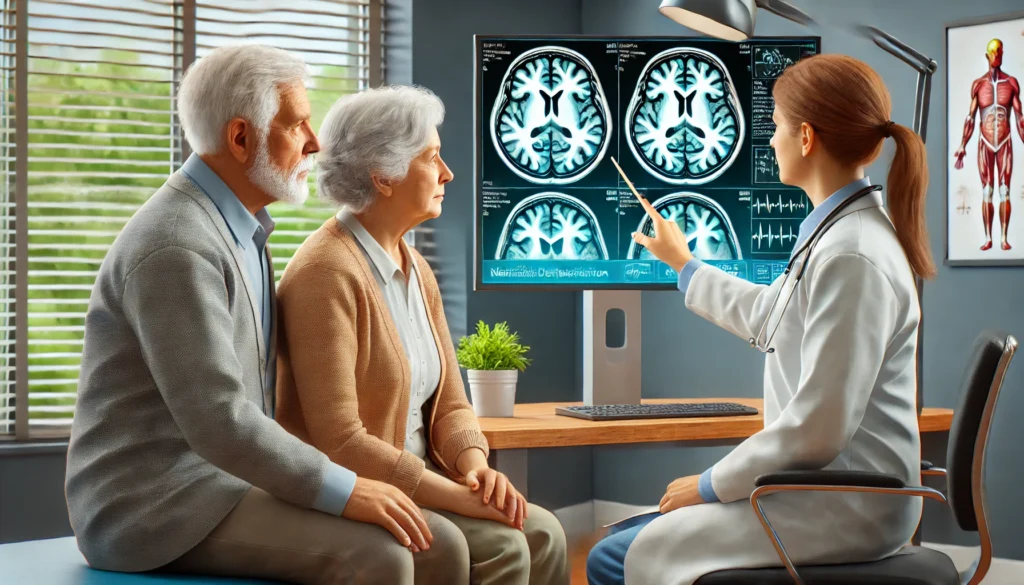Mild Cognitive Impairment is often divided into two main categories: amnestic and non-amnestic. These distinctions help us understand the different manifestations of MCI and provide insight into their progression. Each type affects different areas of cognition and has varying implications for future cognitive health.
You may also like: Tips to Improve Low Average Memory Performance
Amnestic MCI
Amnestic MCI primarily affects memory, which is a crucial aspect of daily functioning. Individuals with this type of MCI may frequently forget appointments, conversations, or recent events. This condition can be a precursor to Alzheimer’s disease, a type of dementia characterized by severe memory loss and cognitive decline. Understanding the warning signs of amnestic MCI can facilitate early intervention and potentially slow its progression.
Memory Challenges and Daily Life
Those with amnestic MCI often struggle with short-term memory, impacting their ability to retain new information. This can lead to repetitive questions and difficulty following conversations, causing frustration in social interactions. As these memory lapses become more frequent, they can affect confidence and independence.
Link to Alzheimer’s Disease
The connection between amnestic MCI and Alzheimer’s disease is well-documented, with many individuals eventually progressing to this form of dementia. Research indicates that changes in brain structure and function during amnestic MCI resemble early Alzheimer’s, making early detection and monitoring essential. The presence of amyloid plaques and tau tangles in the brain often signifies this transition.
Early Detection and Management
Timely diagnosis of amnestic MCI allows for strategies that can mitigate its impact. Cognitive therapies, lifestyle adjustments, and medications can be employed to maintain memory function. Regular monitoring and assessments can help tailor these interventions to individual needs, improving outcomes.
Non-Amnestic MCI
Non-amnestic MCI affects cognitive functions other than memory, such as attention, language, and visual/spatial skills. This form of MCI may progress to other types of dementia, like frontotemporal dementia or dementia with Lewy bodies, depending on which cognitive functions are primarily impacted. Recognizing the diverse symptoms of non-amnestic MCI is crucial for appropriate diagnosis and care.
Attention and Concentration Issues
Individuals with non-amnestic MCI may find it challenging to maintain focus on tasks or conversations. This can lead to difficulties in work or hobbies that require sustained attention. These challenges can affect productivity and quality of life, necessitating support and adaptations in daily activities.
Language and Communication Difficulties
Language deficits in non-amnestic MCI can manifest as trouble finding the right words, leading to hesitations in speech. This can hinder effective communication, causing misunderstandings and social withdrawal. Speech and language therapy can offer strategies to manage these issues, improving interaction and engagement.

Visual and Spatial Recognition
Problems with visual and spatial skills can result in difficulties navigating familiar environments or judging distances. This can increase the risk of accidents and decrease mobility. Occupational therapy interventions can provide practical solutions to enhance safety and confidence in movement.
How Fast Does Mild Cognitive Impairment Progress?
The rate at which MCI progresses can vary greatly among individuals, making it a complex condition to predict. Several factors, such as the type of MCI, age, genetics, and lifestyle, play significant roles in its progression. Understanding these factors can help in anticipating the course of MCI and planning appropriate interventions.
Factors Influencing Progression
The progression of MCI is influenced by a myriad of factors, each contributing to the complexity of the condition. By examining these elements, we can gain insights into potential outcomes and tailor management strategies effectively.
Type of MCI
Amnestic MCI generally progresses more quickly to Alzheimer’s disease compared to non-amnestic MCI, which may lead to other forms of dementia. Understanding the specific type of MCI aids in predicting potential developments and customizing interventions. Specialized cognitive assessments can help differentiate between types, guiding targeted therapies.
Age and Its Impact
While MCI can occur at any age, the average age for mild cognitive impairment diagnosis is typically around 65. Age-related changes in the brain can influence how quickly MCI progresses. Older individuals may experience a more rapid decline, necessitating proactive measures to manage cognitive health.
Genetic Factors
Family history and genetic factors, such as the presence of the APOE ε4 allele, may increase the risk of progression from MCI to dementia. Genetic testing can provide valuable information about risk levels, enabling personalized approaches to prevention and care. Awareness of genetic predispositions can motivate early lifestyle modifications.
Lifestyle Influences
Physical activity, diet, and social engagement are critical in influencing the progression of MCI. A lifestyle that includes regular exercise, a balanced diet, and mental stimulation can slow cognitive decline. Implementing these changes can enhance overall well-being and cognitive resilience, offering hope for maintaining quality of life.
Average Progression Rate
Studies indicate that approximately 10-15% of people with MCI progress to dementia each year. However, some individuals remain stable or even improve, highlighting the variability in MCI progression. Monitoring cognitive function over time allows for adjustments in care strategies, adapting to changes as they occur.
Stability and Improvement
A significant portion of individuals with MCI may experience stability or improvement in cognitive function. This can result from effective management strategies and lifestyle changes that support brain health. Regular cognitive evaluations can identify improvements, providing motivation and reassurance for individuals and caregivers.
Variability Among Individuals
The progression of MCI is not uniform, with some experiencing rapid decline while others remain stable for years. Factors such as comorbidities, mental health, and social support play roles in this variability. Personalized care plans that consider these factors can enhance management and outcomes.
Long-term Monitoring and Adaptation
Consistent monitoring of cognitive function is essential in managing MCI, allowing for timely adaptations in care. Regular assessments help track changes and guide interventions, ensuring they remain relevant and effective. This proactive approach can mitigate potential declines and support independence.
Historical Context and Current Trends
The concept of MCI has evolved over the years. Initially, cognitive decline was largely attributed to normal aging. However, research has established MCI as a distinct clinical condition with potential for progression to dementia. This evolution in understanding has led to significant advancements in diagnosis and care.
Evolution of MCI Understanding
Historically, cognitive decline in older adults was often dismissed as a natural part of aging. The recognition of MCI as a separate condition has transformed perceptions and approaches to cognitive health. This shift has prompted increased research and awareness, fostering a more nuanced understanding of cognitive aging.
Early Misconceptions
In the past, the signs of MCI were often overlooked or misattributed to aging, delaying intervention. Misunderstandings about cognitive decline hindered early detection and treatment efforts. Greater awareness and education have since improved recognition and response to MCI symptoms.
Research Milestones
Key studies and discoveries have shaped our current understanding of MCI, highlighting its complexity and potential for progression. Research into the biological and psychological aspects of MCI has provided insights into its mechanisms and risk factors. These milestones have informed strategies for early detection and management.
Changing Diagnostic Criteria
Diagnostic criteria for MCI have evolved, reflecting advances in research and clinical practice. Improved criteria enhance the accuracy of diagnosis, allowing for more precise identification and treatment. This evolution supports better outcomes and quality of life for those affected by MCI.
Current Trends in Research
Current trends in research focus on identifying biomarkers for early detection and developing interventions to halt or slow the progression of MCI. These trends hold promise for the future of cognitive health management, offering potential breakthroughs in prevention and treatment.
Biomarkers and Early Detection
The search for reliable biomarkers has gained momentum, aiming to identify MCI before significant cognitive decline occurs. Biomarkers such as amyloid and tau levels, as well as neuroimaging techniques, are under investigation. Early detection through biomarkers could revolutionize treatment approaches, enabling timely interventions.
Intervention Strategies
Research is exploring various intervention strategies, from pharmacological treatments to lifestyle modifications. Studies on dietary supplements, exercise programs, and cognitive therapies seek to find effective methods for slowing MCI progression. These strategies aim to enhance cognitive function and delay the onset of dementia.
Collaborative Research Efforts
Collaboration among researchers, clinicians, and organizations is driving progress in understanding and managing MCI. Shared knowledge and resources facilitate comprehensive studies and innovative solutions. These efforts are critical in advancing the field and improving outcomes for individuals with MCI.
Future Implications of MCI Research
The future of MCI research lies in precision medicine, aiming to tailor interventions based on an individual’s genetic makeup and lifestyle. Advancements in neuroimaging and biomarker discovery will play crucial roles in developing personalized treatment plans. These innovations hold the potential to transform the landscape of cognitive health care.
Precision Medicine and Personalized Care
Precision medicine offers a promising approach to MCI management, emphasizing individualized care. By considering genetic, environmental, and lifestyle factors, treatments can be customized to meet specific needs. This personalized approach has the potential to enhance efficacy and improve quality of life.
Role of Genetics
Genetic insights are integral to precision medicine, informing risk assessment and treatment decisions. Understanding genetic predispositions can guide preventive strategies and therapeutic choices. Genetic counseling and testing may become standard components of MCI care, enabling proactive management.

Lifestyle and Environmental Factors
Tailoring interventions to an individual’s lifestyle and environment can optimize outcomes and support cognitive health. Factors such as diet, exercise, and social engagement are considered in developing comprehensive care plans. This holistic approach addresses multiple aspects of well-being, promoting resilience against cognitive decline.
Integration of Technology
Technology plays a pivotal role in advancing precision medicine, offering tools for monitoring and intervention. Wearable devices, mobile apps, and telemedicine facilitate real-time data collection and personalized feedback. These innovations support continuous care and empower individuals to actively manage their cognitive health.
Nootropics and Biohacking
Biohackers are increasingly interested in nootropics—supplements and substances that claim to improve cognitive function. While the efficacy of these substances is still under investigation, they represent a frontier in the pursuit of optimizing brain health. The exploration of nootropics offers insights into potential cognitive enhancement strategies.
Understanding Nootropics
Nootropics encompass a range of substances, from natural supplements to synthetic compounds, purported to enhance cognitive abilities. While some are backed by research, others require further study to establish their benefits and safety. Understanding the mechanisms and effects of nootropics is essential for informed use and integration into MCI care.
Ethical Considerations
The use of nootropics raises ethical questions about cognitive enhancement and accessibility. Concerns about fairness, safety, and regulation necessitate careful consideration and guidelines. Addressing these issues is crucial as interest in cognitive enhancement grows.
Research and Innovation
Ongoing research into nootropics and biohacking seeks to uncover effective and safe cognitive enhancers. Collaboration between scientists, clinicians, and consumers is vital in exploring these possibilities. Innovations in this field have the potential to contribute to broader strategies for maintaining and improving cognitive health.
Practical Advice for Managing MCI
While the progression of MCI can be unpredictable, there are strategies to manage the condition effectively. By adopting proactive measures, individuals can maintain cognitive function and enhance their quality of life. Practical advice focuses on cognitive training, lifestyle modifications, and regular medical check-ups.
Cognitive Training
Engaging in cognitive exercises, such as puzzles, memory games, and learning new skills, can help maintain cognitive function. These activities stimulate the brain, promoting neuroplasticity and cognitive resilience. Regular participation in cognitive training can slow decline and support mental agility.
Benefits of Cognitive Exercises
Cognitive exercises enhance various mental functions, including memory, attention, and problem-solving. By challenging the brain, these activities help preserve cognitive abilities and delay the onset of more severe impairments. The benefits extend beyond cognition, improving mood and overall well-being.
Incorporating New Skills
Learning new skills or hobbies can provide mental stimulation and enjoyment. Activities such as language learning, musical instruments, or creative arts engage different brain areas, fostering cognitive health. Incorporating these pursuits into daily routines can offer both cognitive and emotional rewards.
Social and Group Activities
Participating in group activities or classes adds a social dimension to cognitive training, enhancing motivation and engagement. Social interaction provides mental stimulation and emotional support, contributing to brain health. These activities create opportunities for meaningful connections and shared experiences.
Lifestyle Modifications
Adopting a brain-healthy lifestyle is crucial for managing MCI. This includes a diet rich in omega-3 fatty acids, antioxidants, and vitamins, regular physical activity, and maintaining social connections. Lifestyle modifications support overall health and cognitive function.
Importance of Nutrition
A balanced diet that includes fruits, vegetables, whole grains, and lean proteins supports brain health. Nutrients such as omega-3s and antioxidants play roles in protecting against cognitive decline. Dietary choices can influence brain structure and function, emphasizing the importance of nutrition in MCI care.
Physical Activity and Exercise
Regular physical activity is associated with improved cognitive function and reduced risk of cognitive decline. Exercise increases blood flow to the brain, promoting neurogenesis and synaptic plasticity. Incorporating activities such as walking, swimming, or yoga into daily routines can support cognitive health.
Social Engagement and Support
Maintaining social connections and participating in community activities can enhance cognitive resilience. Social engagement provides opportunities for mental stimulation and emotional well-being. Building and nurturing relationships contribute to a supportive network, essential for managing MCI.
Regular Medical Check-Ups
Regular visits to a healthcare provider can help monitor cognitive changes and adjust management strategies as needed. Early intervention is key to slowing the progression of MCI. Medical check-ups ensure that individuals receive appropriate care and support for their cognitive health.
Monitoring Cognitive Changes
Healthcare providers can assess cognitive function through regular evaluations, identifying changes that may require intervention. Early detection of cognitive decline allows for timely adjustments in care plans. Monitoring provides reassurance and guidance for individuals and caregivers.
Adjusting Management Strategies
As MCI progresses, management strategies may need to be adapted to address evolving needs. Healthcare providers can offer recommendations for medications, therapies, or lifestyle changes. Collaborative care ensures that interventions remain relevant and effective.
Accessing Resources and Support
Healthcare providers can connect individuals with resources and support services, enhancing care and quality of life. Access to educational materials, support groups, and community programs can empower individuals and caregivers. Comprehensive support networks contribute to successful MCI management.

Conclusion
Understanding the progression of Mild Cognitive Impairment is vital for those affected and their caregivers. While MCI can progress to more severe cognitive disorders, the trajectory is not set in stone. With the right strategies and interventions, it is possible to manage MCI effectively and maintain a good quality of life. By staying informed and proactive, individuals can take control of their cognitive health and navigate the challenges of MCI with confidence.
The journey to understanding and managing MCI continues to evolve with ongoing research and emerging trends. By embracing advancements in science and healthcare, we can enhance our approach to cognitive health and support those living with MCI. The future holds promise for improved detection, intervention, and care, offering hope for better outcomes and quality of life.
Further Reading:
Staving off dementia when you have mild cognitive impairment
Higher risk of progression to dementia in mild cognitive impairment cases who revert to normal
Important Note: The information contained in this article is for general informational purposes only, and should not be construed as health or medical advice, nor is it intended to diagnose, prevent, treat, or cure any disease or health condition. Before embarking on any diet, fitness regimen, or program of nutritional supplementation, it is advisable to consult your healthcare professional in order to determine its safety and probable efficacy in terms of your individual state of health.
Regarding Nutritional Supplements Or Other Non-Prescription Health Products: If any nutritional supplements or other non-prescription health products are mentioned in the foregoing article, any claims or statements made about them have not been evaluated by the U.S. Food and Drug Administration, and such nutritional supplements or other health products are not intended to diagnose, treat, cure, or prevent any disease.


